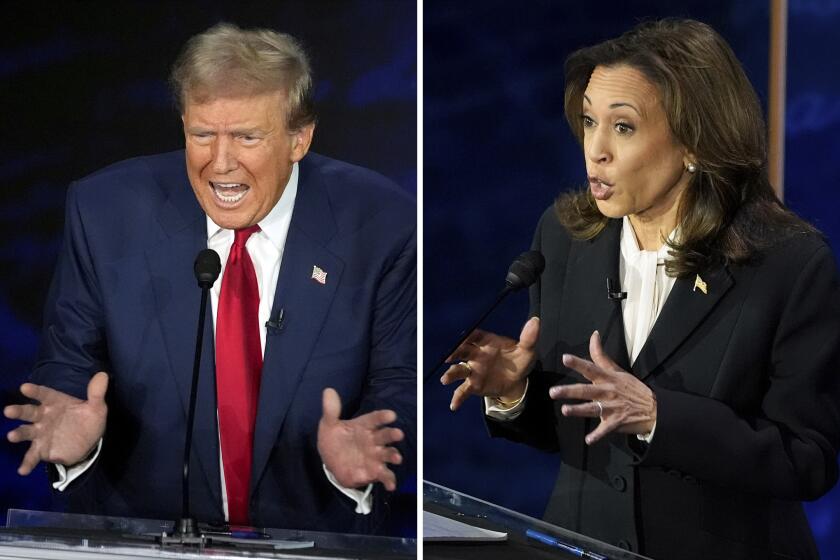A crash course in American coarseness
Incivility is the new secondhand smoke. Everyone feels impelled to disdain it, but nobody is willing to do away with it entirely.
Besides, it’s profitable. Look at South Carolina Rep. Joe Wilson. Two weeks ago, he was just a loudmouth with the bad taste to shout an insult at the president of the United States from the House floor. Since then, he’s become a right-wing darling, and $2 million in new campaign contributions have flowed his way. Incivility apparently cuts both ways, though; his Democratic challenger has taken in more than $1.5 million.
When the midterm elections roll around, those millions will buy a lot of attack ads, because -- as any campaign strategist will tell you -- negative advertising works. That’s the reason there is so much of it in our campaigns. People enjoy incivility -- maybe because it’s easy to remember; maybe because it’s entertaining. We’ve become a nation of Alice Roosevelt Longworths: “If you haven’t got anything nice to say about anybody, come sit next to me.”
(Frankly, Wilson’s comments weren’t the worst imaginable. His longtime political consultant and fellow neo-Confederate, Richard Quinn, for instance, is even more offensive: He markets T-shirts emblazoned with Lincoln’s portrait and the words “Sic Semper Tyrannis,” which is what John Wilkes Booth shouted as he fled Ford’s Theater.)
These days, everyone seems to remember a time in the relatively recent past when civility wasn’t in such short supply and when rudeness and boorishness of the Wilson variety wouldn’t be tolerated. So the natural question is: How did we get here?
Actually, our recent descent into boorishness didn’t begin on the political platform but on the stage -- not with our politicians but with our stand-up comics. Sometime in the late 1950s, the taste for comedy based on edgy political satire (think Lenny Bruce and Mort Sahl) mutated into shtick based on insult (think Don Rickles and Jackie Mason). People, as it turned out, found it highly entertaining to watch other people being insulted.
It was, in economic terms, the commoditization of incivility.
It wasn’t long before foundering AM radio found a savior in the proto-shock jock, Howard Stern, who turned rudeness and transgressive humor of every sort into a morning staple for millions of Americans. Incivility the commodity had found a broad new market, built on the animating insight that people found insults entertaining.
Not long afterward, conservative activists eager to put together syndication networks that would promote their cause began marketing radio talk shows. They’d learned from Stern, and so -- by and large -- right-wing talk radio made itself entertaining by dishing up as many insults per hour as possible. Rush Limbaugh was the avatar of this tendency, pioneering a dynamic fusion of popular culture and movement partisanship. No more patrician-accented William F. Buckleyesque rep tie elitism for the born-again right. Abuse didn’t just bring in ratings and dollars; it also got out the vote.
From there, it was just a short hop to our current politics of incivility for all the obvious reasons. From the perspective of cultural history, you can draw a straight line from Rickles’ Las Vegas lounge act through Stern and Limbaugh and on to Wilson’s big mouth.
This explanation of what ails our politics is fine, as far as it goes. But it ignores the far larger, more insidious problem that we face in American public discourse today.
It’s not that we suffer from an insufficient respect for civility; taken as a whole, our electoral politics have always been essentially uncivil, from the founding of the country to the present day. The problem is that we suffer from an insufficient regard for the facts.
Without facts there is no argument, and without argument there is no persuasion. Argument plus civility is dialogue, and that produces compromise, which is what permits people of good conscience to live peacefully with one another even though they hold different views.
The growing culture of assertion and the death of persuasion, rather than the loss of civility, are what we ought to fear about our politics. Because there’s no insistence on a common set of facts, we’re perilously close to the point at which we stop even talking past each other and the language of our politics dissolves into mutually unintelligible dialects.
As the late Daniel Patrick Moynihan liked to say, “Everyone is entitled to his own opinion, but not his own facts.”
More to Read
Get the L.A. Times Politics newsletter
Deeply reported insights into legislation, politics and policy from Sacramento, Washington and beyond. In your inbox three times per week.
You may occasionally receive promotional content from the Los Angeles Times.










